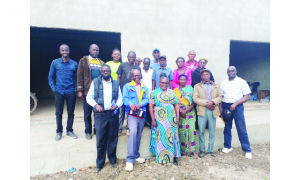By HAPPY MULOLANI-
“FOR women to effectively participate in value chains, an enabling environment needs to be created as that will facilitate equal opportunities in selected value chains.”
This in an observation made by Gender Expert Faides Temba Temba who observes that as communities keep evolving, women need to be given equal opportunities as men.
This will help the women to increase their production and volumes.
This comes amidst the realisation that despite women producing over 60 per cent of the food in Zambia, they are still subordinated in their value chains.
A study conducted by Sitko in 2011 indicated that in Zambia, at least 78 per cent of women are actively engaged in agriculture production as opposed to 69 per cent of men. Despite their immense contribution in agriculture, ‘the women still have less access to agricultural resources such as land, labour and credit than men.’
This is attributed to dominant patriarchal notions which position men as dominant and women as subordinate.
Most norms and cultures tend to favour men while suppressing women despite their active engagement in agriculture production.
While International Fund for Agricultural Development (IFAD) 2010 argues that despite female farmers being the primary producers of food, they are often overlooked and underestimated in development strategies.
This notion explains why agriculture production in the rural setup is often marred by gender related constraints and unequal access to resources.
However, to achieve tangible progress and contribute to poverty reduction in agriculture, it is apparent that these constraints women face both in production and market participation are addressed.
As Ragasa 2012 observes, women’s productivity in agriculture largely depends on them having access to productive resources, such as land, credit, extension and other agricultural technologies.
Often times, norms and cultures have caused farmer communities to record low yields due to women subordinated positions in their value chains.
However, it should be noted that most of these norms and cultures do not give women equal opportunities, thereby depriving them the chance to effectively contribute to increased production, production and increased volumes in their value chains.
Interestingly, this is amid the existence of a number of policies meant to support women access to equal opportunities as men.
For instance, the Equality Act 2015 advocates for women empowerment at all levels.
This backdrop provides a premise to address the gender imbalances which are retrogressive in various value chains.
One such approach is the Gender Action Learning System (GALS).
The Smallholder Agribusiness Promotion Programme (E-SAPP) has since partnered with Oxfam in facilitating GALS to smallholder farmers the programme is working with in focal areas.
GALS is an approach which places emphasis on how men and women ought to focus in their value chains with respect to planning and vision setting.
Through this approach, smallholder farmers are assisted to overcome the challenges of gender imbalances across their selected value chains.
Oxfam, is an international organisation which has been in the forefront of promoting the GALS initiative in countries such as India, Malawi, Zimbabwe and now Zambia. Tremendous strides in these countries has shown that as households plan together, they achieve better results hence the need to adopt this approach in agriculture enterprises.
Oxfam Zambia Program Manager Chama Mwandalesa said the organisation had closely worked with E-SAPP in the development of the gender mapping analysis and gender strategy coupled with farmer trainings.
“Early this year, Oxfam trained master trainers from selected provinces on GALS and is now rolling out this approach to farmer communities for them to effectively participate in addressing the gender imbalances. This approach will ensure both women and men work towards empowering their communities through shared visions and collective efforts,” Ms Mwandalesa said.
Dennis Jalabani, one of the trained farmers in Makafu Agriculture Camp in Kapiri district in Central Province, expressed gratitude for the approach imparted to the over 30 farmers who recently undertook the gender awareness and GALS training.
Mr Jalabani urged fellow farmers to develop shared visions in order to have collective efforts in their value chains if they are to make significant gains in their farming communities.
While gender imbalances may have affected the value chains, the GALS approach is worth adopting and applying in farmers’ value chains.
Although, cultures and norms define societies, it is key to be selective in terms of what works for farmers as they engage in their agriculture activities.
With the GALS approach imparted to smallholder farmers, it is envisaged that a critical mass of farmers will re-think their way of engaging in value chains by translating individual plans into shared visions and collective effort.
In this way, it will positively impact on their livelihoods in their respective farmer communities.-NAIS.







